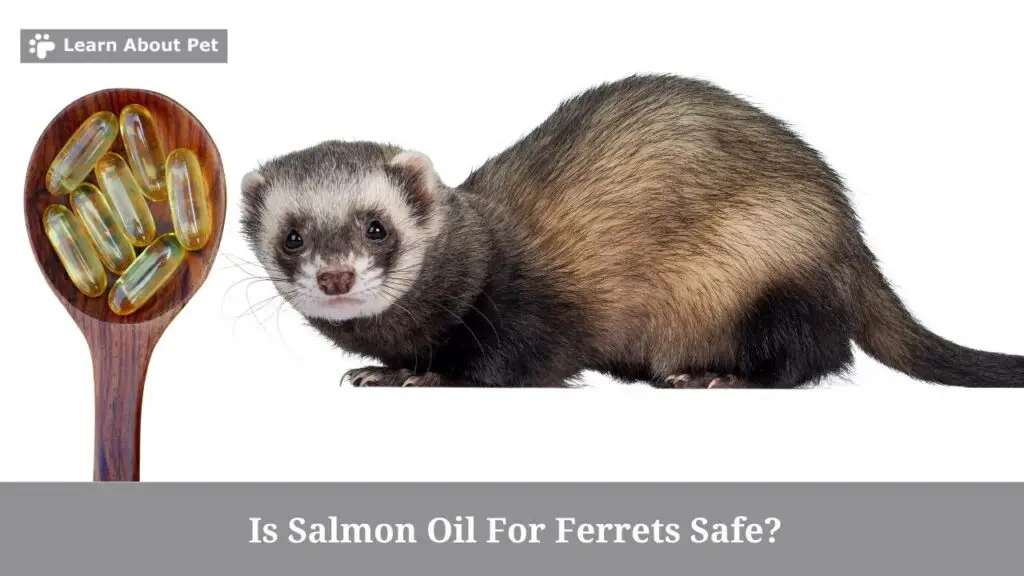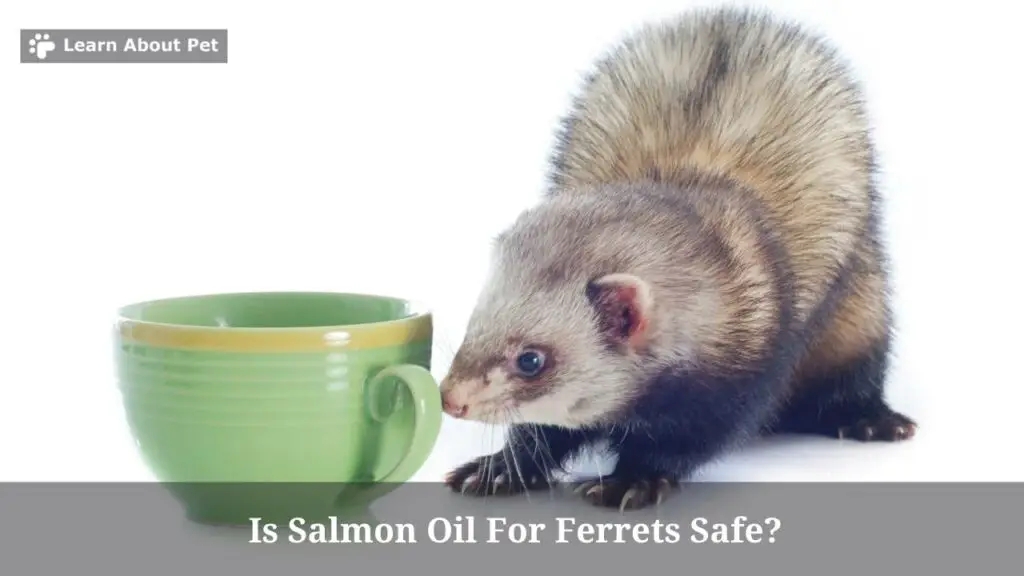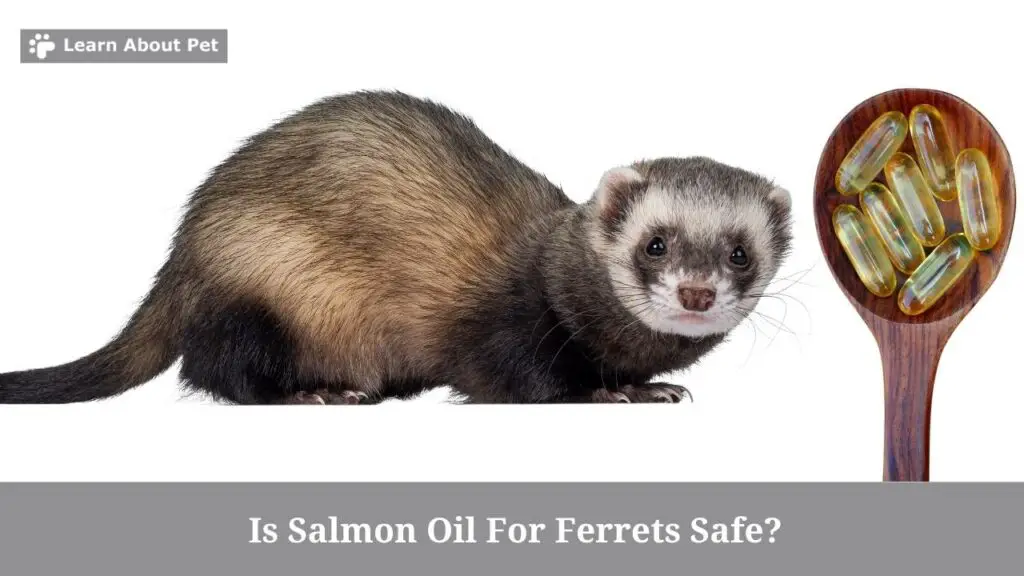Salmon oil is said to be one of the best treats you can give to your pet ferrets. In this article, you will find information on what salmon oil does for ferrets, whether salmon oil is safe for ferrets and if so, how much salmon oil ferrets should have.
Salmon oil for ferrets is both safe and beneficial. The ferrets normally like the taste of it. It is rich in omega-3 and omega-6 fats, and is therefore good for ferrets’ skin and fur health, as well as the ferrets’ brain and heart health.
You only need to ensure that you use high quality salmon oil for ferrets well-being.

Otherwise when it comes to healthy treats for ferrets salmon oil comes somewhere near the top. It is sold alongside other types of fish oils for ferrets, and is meant to be used as an occasional treat.
Thus when thinking of an ideal treat to give to your ferret, salmon oil is always worth considering.
What Is Salmon Oil?
As its name suggests, salmon oil is a type of liquid fat that is extracted from the ray-finned fish known as salmon.
Normally, wild caught salmon fish meat is subjected to a cold pressing process, in order to extract the oil.
Do Ferrets Like Salmon Oil?
Yes, ferrets tend to like the taste of salmon oil a great deal.
Granted, if it is new to them, they may at first be hesitant about it. But in due course, they usually come to like it a great deal.
Often, they like it to the extent of licking the bottle containing the salmon oil, if they happen to come across it!
Is Salmon Oil Safe For Ferrets?
Salmon oil (in moderation) is safe for ferrets.
Many people who keep pet ferrets feed them on salmon oil from time to time. And the ferrets never seem to suffer any harm on account of consuming salmon oil.
On that account, we can say that salmon oil is safe for ferrets.
Moreover, when you subject salmon oil to chemical analysis, you find nothing in it that can harm ferrets.
The main components in salmon oil are compounds like omega-3 and omega-6.
So we need to ask ourselves questions like, can ferrets have Omega 3 safely? And can ferrets have omega 6 safely. The answer to all such questions is ‘yes’.
We therefore come to the conclusion that salmon oil is safe for ferrets. That is as long as the ferrets have the salmon oil in moderation. And as long as the salmon oil is not contaminated.
Is Salmon Oil Good For Ferrets?
Salmon oil is good for ferrets.
The benefits of salmon oil for ferrets range from better skin and fur health to better heart and brain health.
Salmon oil can also be helpful when administering medications to ferrets. For instance, giving prednisolone pill mixed in salmon oil for ferrets may be better than trying to get the ferret to ingest the bare medication.
So we see six distinct ways in which salmon oil can be good for ferrets.
Firstly, the salmon oil can help the ferrets have healthier skin.
Secondly, the salmon oil can help the ferrets have better looking and healthier fur.
Thirdly, through the salmon oil, the ferrets can get healthier hearts.
Fourthly, through the salmon oil, the ferrets can get healthier brains.
Fifthly, the salmon oil can make the ferrets’ lives happier: as it is something whose taste they genuinely enjoy.
And sixthly, the salmon oil can be helpful in getting the ferrets to take medications that they would otherwise be very hesitant to ingest.
Thus a healthy salmon oil treat for ferrets can be good in these ways.

What Does Salmon Oil Do For Ferrets?
There are several things that salmon oil does for ferrets.
For starters, salmon oil helps ferrets to have better looking coats. That is because it promotes better health in both the ferrets’ skins and furs. The end result is a better-looking ferret coat.
Moreover, the salmon oil helps the ferrets to have better heart and brain health. This is on account of the omega 3 and omega 6 oils that the salmon oil is rich in.
To the extent that it promotes better hearth and brain health, the salmon oil may help the ferrets in having longer and happier lives.
What Kind Of Salmon Oil Is Good For Ferrets?
There are lots of salmon oil products on sale in the market today.
This leads to a question on which ones are ideal for ferrets. More specifically, for instance, what kind of salmon oil for ferrets is safe? And what kind of salmon oil is beneficial for ferrets?
Some may even go as far as asking, what brand salmon oil is recommended for ferrets?
So, indeed, what is the best salmon oil for ferrets?
As it turns out, the best salmon oil product for ferrets is that which is pure: with no additives.
Ideally, this should be oil that has been extracted from wild salmon. For instance, wild Alaskan salmon oil for ferrets or grizzly salmon oil for ferrets may be very ideal.
You may need to check the packaging of the salmon oil. Salmon oil that comes in glass bottles may be better than that which comes in plastic bottles. The one in plastic bottles may become contaminated, due to the leaching effect…
So there are three things to check in a salmon oil product for ferrets.
Firstly, ensure that it is genuinely salmon oil: not some other product masquerading as salmon oil.
Secondly, ensure that it is without preservatives. If there must be preservatives, ensure that they are those that are safe for ferrets.
Thirdly, ensure that it is properly packaged. Avoid salmon oil in plastic packaging, which may have gotten contaminated with plastic micro-particles due to the leaching effect.
How Much Salmon Oil Can I Give My Ferret?
If you give too much salmon oil to your ferret, there may be health issues. The ferret may develop diarrhea, and other problems of that nature.
So, how much is too much salmon oil for ferrets? Ideally, you should give your ferret one tablespoon of salmon oil per week. But you don’t give the entire tablespoon at once. You spread it out throughout the week.
Just ensure that your ferret gets no more than one tablespoon of salmon oil per week. Anything above one tablespoon of salmon oil per week may be too much.
Most salmon oil products come with a dropper. You can use the said dropper to keep track of the salmon oil dosage. This is to ensure that you don’t go beyond one tablespoon per week.
Final Verdict – Salmon Oil For Ferrets
Salmon oil is safe for ferrets. That is as long as the ferrets don’t have too much of it. And as long as the said salmon oil is not contaminated with substances that are harmful to ferrets. Thus pure salmon oil is safe for ferrets.
It promotes good skin and fur health. It also promotes good heart and brain health in the ferrets.
Ferrets like the salmon oil taste a great deal. This means that using the salmon oil as a treat for ferrets is a possibility.
It also means that you can use the salmon oil to ‘mask’ unpalatable things for the ferrets to ingest.

For instance, while dispensing medications to ferrets, salmon oil can be helpful. If you mix the medications with the salmon oil, the ferrets are likely to easily lap them up.
You can also use the salmon oil to entice the ferrets into eating healthy foods that they dislike. You just sprinkle the salmon oil over such foods, thus enticing the ferrets to feed on them.
However, too much salmon oil can cause health problems such as diarrhea for ferrets. Ideally, a ferret should have no more than 1 tablespoon of salmon oil spread over the week.
As a pet lover, make sure to learn about pet more and give your pet ferret a good and comfortable life!

Welcome to Learn About Pet. My name is Rajkumar Ravichandran and I love all pets, travel, and amazing food. I write about my passion and personal experience caring for multiple pets in this blog! ❤️
Post Disclaimer
DISCLAIMER: THIS BLOG OR WEBSITE, "Learn About Pet", DOES NOT PROVIDE YOU WITH MEDICAL ADVICE AND IS NOT A SUBSTITUTE FOR MEDICAL ADVICE. ALWAYS GET IN TOUCH WITH YOUR PERSONAL VETERINARIAN AND USE INFORMATION HERE AS GENERAL ADVICE.
The information, including but not limited to, text, graphics, images and other material contained on this website are for informational purposes only. No material on this site is intended to be a substitute for professional veterinary advice, food recommendation, diagnosis, or treatment. Always seek the advice of your veterinarian or other qualified health care provider with any questions you may have regarding a medical condition or for pet food related questions.







